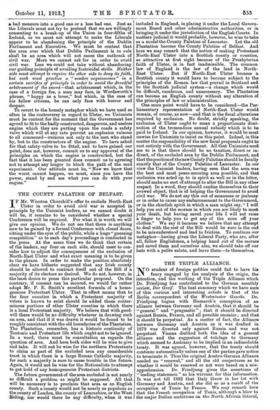THE COUNTY PALATINE OF BELFAST.
IF Mr. Winston Churchill's offer to exclude North-East Ulster in order to avoid civil war is accepted in principle by the Unionist leaders, as we cannot doubt it will be, it remains to be considered whether a special Conference will be required. For what it is worth we will give our opinion. We do not see that there is anything now to be gained by a formal Conference with closed doors, sitting under the eyes of the public, while a huge " guessing competition " as to each day's proceedings is conducted in the press. At the same time we do think that certain of the leaders, say four on each side, should meet to con- sider how to adjust the consequences of the exclusion of North-East Ulster and what exact meaning is to be aiven to the phrase. In order to make the position absolutely clear we have hitherto suggested that any Irish county should be allowed to contract itself out of the Bill if a majority of its electors so desired. We do not, however, in the least desire to press this particular proposal. On the contrary, if consent can be secured, we would far rather adopt Mr. F. E. Smith's excellent formula of a homo- geneous Protestant Ulster. That in effect means that to the four counties in which a Protestant majority of voters is known to exist should be added those conter- minous portions of other Ulster counties in which there is a local Protestant majority. We believe that with good- will there would be no difficulty whatever in drawing such an area, and that if it was drawn it would be found to be roughly consistent with the old boundaries of the Plantation. The Plantation, remember, has a historic continuity of Teutonic and Protestant life which ought not to be ignored. In a word, there must be consultation as regards the question of area. And here both sides will be wise to give and take. It will not be wise for the northern Protestants to claim as part of the excluded area any considerable tract in which there is a large Roman Catholic majority, for such a majority is sure to cause trouble in the future. Again, it would not be wise for the Nationalists to attempt to get hold of any homogeneous Protestant districts.
The future government of the area excluded is not nearly so difficult a problem as might be supposed. All that will be necessary is to proclaim that area as an English county. Such a county would not be nearly as populous as the county of London, the county of Lancashire, or the West Riding, nor would there be any difficulty, when it was included in England, in placing it under the Local Govern- ment Board and other administrative authorities, or in bringing it under the jurisdiction of the English Courts. In matters judicial it would probably, however, be wise to take as a model the County Palatine of Lancaster. Let the old Plantation become the County Palatine of Belfast. And here we may remark that the notion of making Protestant North-East Ulster into a Scottish county or counties, so attractive at first sight because of the Presbyterian faith of Ulster, is in fact inadmissible. The common law of England is the law of the land in North- East Ulster. But if North-East Ulster became a Scottish county it would have to become subject to the principles of the Roman law that prevail in Scotland and to the Scottish judicial system—a change which would be difficult, cumbrous, and unnecessary. The Plantation can become an English county without any alteration of the principles of law or administration.
One more point would have to be considered—the Par- liamentary representation of North-East Ulster would remain, of course, as now—and that is the fiscal alterations required by exclusion. No doubt, strictly speaking, the exclusion of Ulster ought to mean a proportionate dimi- nution of the tremendous annual subsidy which is to be paid to Ireland. In our opinion, however, it would be most unwise for Unionists to insist on this point. Indeed, in this matter the responsibility of the new fiscal proposals ought to rest entirely with the Government. All that Unionists need see to is that there should be no taxation, direct or in- direct, of the excluded area by the Dublin Parliament, and that the position of the new County Palatine should be fiscally exactly that of the County Palatine of Lancaster. In our view the Unionist leaders, having seen that the area was the best and most peace-securing area possible, and that exclusion was acted up to in spirit as well as in the letter, should make no sort of attempt to alter the Bill in any other respect. In a word, they should confine themselves to their avowed object, that is of helping the Government to avoid civil war. We do not say this out of meanness or jealousy or in order to cause any embarrassment to the Government, or in the churlish spirit in which a man might say, " I will help you out of the morass in which you are likely to meet your death, but having saved your life I will not raise a finger to help you to get any of the mire off your clothes." We say it because we believe that any attempt to deal with the rest of the Bill would be sure in the end to be misunderstood and lead to friction. To continue our metaphor—having given the Liberal Party, who are, after all, fellow Englishmen, a helping hand out of the morass and saved them and ourselves also, we should take off our hats with a polite salute, and leave them—to themselves.














































 Previous page
Previous page